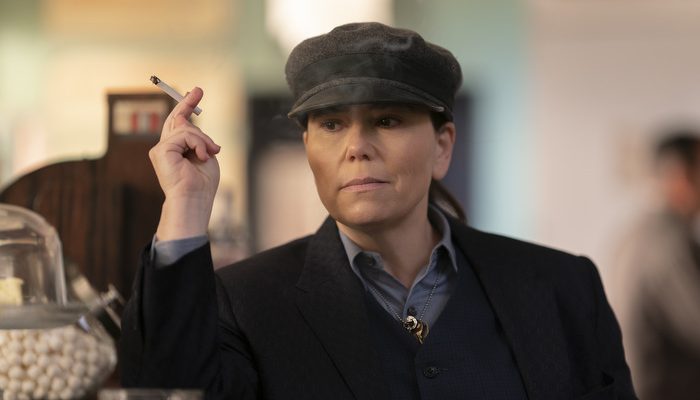A two-time Emmy winner for portraying the equally dynamic and petulant Susie Meyerson, actress Alex Borstein soars to new heights in the fourth season of The Marvelous Mrs. Maisel.
Created by Emmy winner Amy Sherman-Palladino, the series began pre-production on season four under strict Covid restrictions. Nevertheless, the period piece leaped forward in its ambitions with stunning burlesque performances amid its patented rapid-fire banter set in 1960s New York.
Borstein, who has also won an Emmy for voicing Lois Griffin in Family Guy, is a magnetic force as Susie ventures forward as a manager to talented outsiders looking for a chance to breakout.
After the sudden death of her roommate and friend Jackie, played by the late Brian Tarantina, Susie is propelled to act on her representation ambitions and secures herself an office thanks to two mobsters, an assistant with too many family members, and a motley crew of clients ranging from comedians to magicians and, of course, Mrs. Maisel herself.
“Susie’s gotten herself way in over her head with her office space, and the pressure is on, but this is really a family she’s creating for herself,” explains Borstein. “She’s fine being alone, and she expects that she’ll die alone, but this is her version of mothering. These people have these broken wings, and she wants to see them fly.”
Borstein spoke with Awards Focus about the value of Emmy recognition, the joys of starring in a show steeped in Jewish culture, working with Amy Sherman-Palladino to overcome the challenges of filming the emotional eulogy scene, and how she feels watching herself back on screen.
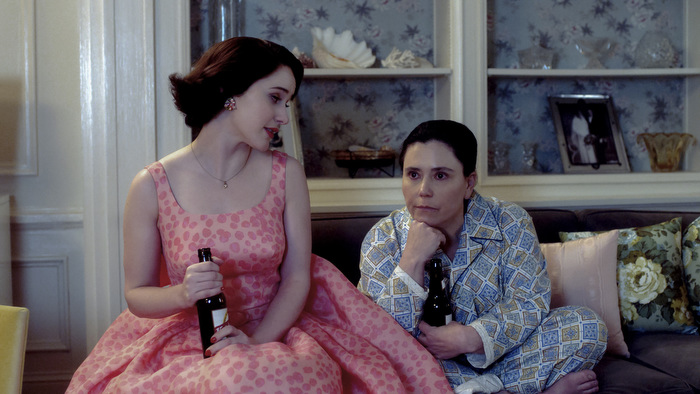
Awards Focus: You’ve won three Emmy’s already in your career. Can you talk about what that recognition means to you?
Alex Borstein: Well, I finally have pleased my father. I can now die and know I achieved something that he’s happy about [laughs].
I’ve been living in Barcelona and when Maisel would finish shooting I would go back there and hang out with my kids. I have my life there. So it’s not like I hit the ground right afterward, trying to collect other work or looking to see how I can parlay this into somebody sponsoring me on Instagram?
I’m curious to see when Maisel ends what it will mean then. How will it translate? There are some things I want to do. I have a feature I’ve written that I want to make, and will I be able to? That’s going to be the real proof in the pudding; can it help me push forward and do other projects?
AF: It’s been almost ten years since Getting On premiered on HBO, and it ended after only three wonderful seasons. Do you think the show was before its time?
Borstein: I think so… it was on HBO at a time when they were really excited about dragons and Game of Thrones and these massive, shiny productions. Entourage had also been a huge thing and we were like a bunch of old women of varying ages and sizes. We had fans that were in the higher-ups [at HBO] but I think in the end they were worried.
But it broke my heart when that show did not go on. I was just kind of like done after that because I didn’t know how anything could be better. I felt like it was perfect and that it was the best work I’d done. So I felt like, well, that’s it.
AF: Coming from your Jewish background, how does it feel to be a part of The Marvelous Mrs. Maisel, which is so steeped in Jewish culture and traditions?
Borstein: It’s like comfort food, you know? It’s so familiar and easy because that’s my upbringing too. What I love about the Weissman’s and the Maisel’s is that they are Jewish-ish. You know, it’s not Shtisel and not everything is by the book. Midge gets her meat from a butcher that also sells pork.
They’re a very real type of Jewish family that has the traditions and the culture, and it’s cultural more than religious. I love that. It gets it so right. It just feels so real and natural, and it’s super fun for me to see that. I’ve seen enough Christmas specials my whole life but it’s really fun to see families that happen to be Jewish incorporate these holidays and have them normalized.
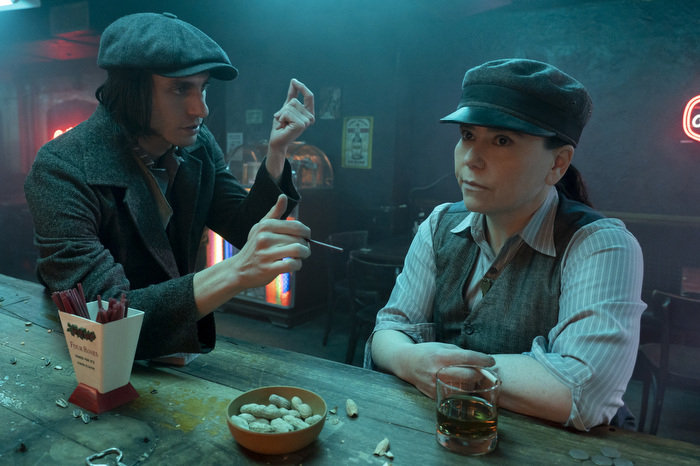
AF: I wanted to get a sense from you of the timeline of season four. Did Covid affect the first table reads or were they still in person?
Borstein: Amazon was incredible about testing us. I felt like I was tested in my sleep. They had a swab in every hole at every hour, every day. We were able to have our table reads in person because we didn’t have the crew or people listening. It was just the cast and the director. Amy [Sherman-Palladino] and Dan [Palladino] were on zoom from Los Angeles. We were seated six feet apart at big tables and could take our masks off at the beginning and put them back on at the end. That was a huge luxury and having that little bit of autonomy was so important to all of our mental health at that time.
AF: The burlesque entertainment at the Wolford Strip Club where Midge works in season four is phenomenal. Did you get to be on set and watch some of the women perform?
Borstein: It was pretty incredible. I know some of the burlesque girls and they’re remarkable. They’ve got a lot of actual New York City burlesque entertainers up there and these incredible dancers. The way they shoot those performances is like nothing you’ve ever seen before. The types of cameras and things they build to make the shots possible are alone something to see.
AF: Season four left me wondering if Midge and Susie are destined for a big break-up because Midge is so reluctant to do anything that actually brings in money. She destroyed that opportunity with Sophie Lennon. Do you think their careers would excel if they weren’t working together?
Borstein: I think they’re each other’s original muse. They drive each other. It’s kind of like her firstborn child, her first love and it’s the romance of the show. I think it’s essential that Midge is somehow a part of Susie’s life. Whether they will be able to work together forever or not will remain to be seen because they do have different ways.
Also, when you think about Midge saying that she refuses to do this and that, in some ways, Midge took on the role of manager whereas Susie was being more of the desperate artist and just saying yes to any gig that presented itself. That’s usually why you hire a manager, to say no, no, no. You’re not doing that diaper commercial because it’s not good for your longevity.
Midge was more confident in her own abilities to see a future and a career, and ultimately what she wants to be. Susie was a little fearful and grabby. I think in some ways maybe that helped Susie stop in her tracks and realize there’s got to be a middle road here where I do what she is saying, where we’re more careful about pairing her up and putting her in the right position.
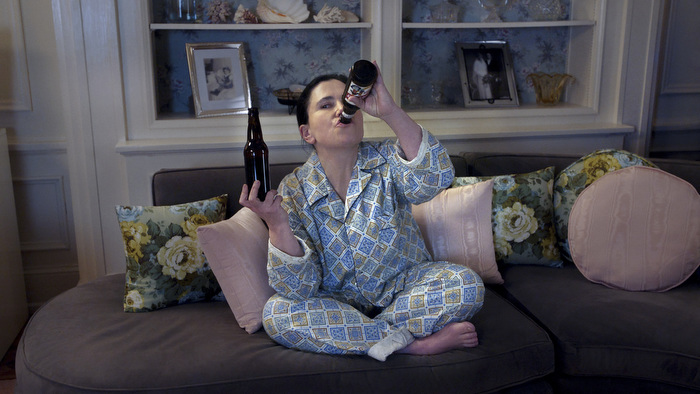
AF: This season Susie wants to reinvent her life after the death of her friend and roommate Jackie. Can you talk about whether Susie is striving for professional advancement or spiritual happiness… or perhaps both?
Borstein: You know, I think it’s both. You said something really interesting. I think Susie makes that claim at the funeral that she is not going to let this happen again. She makes the joke that they’re not going to end up in her apartment, yet what she does for a living is find these people, these oddities, these talents who have no one else that believes in them and she’s going to make them visible and that is a part of her drive.
It’s also monetary because she needs to make a living. She’s gotten herself way in over her head with her office space and the pressure is on, but this is really a family she’s creating for herself. She’s fine being alone and she expects that she’ll die alone, but this is her version of mothering. These people have these broken wings and she wants to see them fly. It’s not charity though. She has to see talent in someone.
AF: I read that the eulogy Susie gives at Jackie’s funeral was partly also a dedication to the late Brian Tarantina who played Jackie. What went through your mind when you were reading the eulogy and were you able to give input on what Susie said?
Borstein: God, it’s so interesting. Reactions to that have been so fierce, and it’s touched a lot of people. I have known Brian for a long time from Gilmore Girls but I never really hung out with him. He lived in New York and I would usually fly back to Barcelona, so there wasn’t a huge social hangout. Some of that made it easier to deliver the eulogy because there’s such a truth that I didn’t know much about this person.
I also had a personal loss just before that Amy knew about, and she knew the person I lost. When she wrote that scene there was a lot of that which she put in there. She knew how I felt and what I was going through and how I talked about the person I lost, a very dear friend of mine. What she wrote, you couldn’t read it without being affected.
I was really terrified when I got it because I didn’t know how I would memorize it all. It was like four pages of monologue and you have to be exact with Amy, and I was terrified I wouldn’t be able to do it. I just didn’t know if I could deliver this as an actor.
It was a very hard day for everybody and we only had the location until six pm, so that was an added pressure. I begged Amy for a teleprompter and she’s like, you can’t use a teleprompter… it’s not news. Of course, she was right, and I promised myself I would get McDonald’s afterward.
But it was the hardest thing. I’ll tell you after we got through the first take of that monologue I was a mess. A lot of the crew were feeling a lot of feelings. Then there was the realization that I had to do it again and again. You have to do like 12 fucking takes of this thing and that was when the reality really set in of how am I going to possibly do this.
But it was so well written that there was no way I could read it off a teleprompter. Sometimes you do something half-assed when the camera’s not exactly on you. The camera was behind me on Rachel [Brosnahan] and it was not possible to half-ass it. Once I started reading those words I could not just be there and feel every feeling.
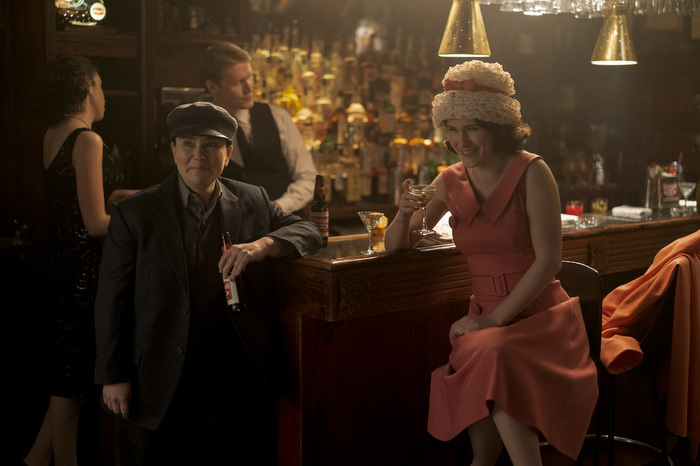
AF: Do you know which number take was used in the end?
Borstein: I really don’t. I haven’t seen it. I haven’t seen the show yet. When Maisel wraps season five, Rachel and I talked about getting together and watching the show. I’ve seen bits and pieces and memes but that’s it.
AF: Do you watch any of the programs you’re in, like Family Guy too?
Borstein: Family Guy is so much easier because it’s me, but it’s not me. When it’s my face and body I can’t handle it. It’s so hard to see what you look like to the rest of the world versus what you feel.
I remember one scene where we were shooting at the Gaslight on Maisel. They showed me a playback and all I was concerned about was how weird my arm looked. So I hid behind the counter and I wouldn’t lift my arm, and I wouldn’t move my neck. I get so caught up in the strangeness of my own body and face and the sound of my voice that I just can’t do it. Anything observed is changed.


